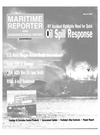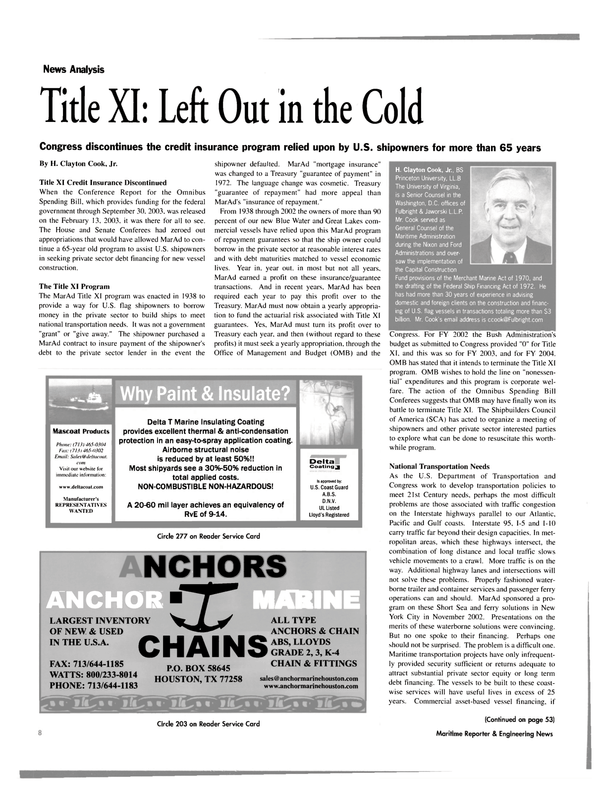
Title XI: Left Out in the Cold
Congress discontinues the credit insurance program relied upon by U.S. shipowners for more than 65 years Title XI Credit Insuranee Discontinued When the Conference Report for the Omnibus Spending Bill, which provides funding for the federal government through September 30, 2003, was released on the February 13, 2003. it was there for all to see.
The House and Senate Conferees had zeroed out appropriations that would have allowed MarAd to continue a 65-year old program to assist U.S. shipowners in seeking private sector debt financing for new vessel construction.
The Title XI Program The MarAd Title XI program was enacted in 1938 to provide a way for U.S. flag shipowners to borrow money in the private sector to build ships to meet national transportation needs. It was not a government "grant" or "give away." The shipowner purchased a MarAd contract to insure payment of the shipowner's debt to the private sector lender in the event the shipowner defaulted. MarAd "mortgage insurance" was changed to a Treasury "guarantee of payment" in 1972. The language change was cosmetic. Treasury "guarantee of repayment" had more appeal than MarAd's "insurance of repayment." From 1938 through 2002 the owners of more than 90 percent of our new Blue Water and Great Lakes commercial vessels have relied upon this MarAd program of repayment guarantees so that the ship owner could borrow in the private sector at reasonable interest rates and with debt maturities matched to vessel economic lives. Year in, year out, in most but not all years.
MarAd earned a profit on these insurance/guarantee transactions. And in recent years. MarAd has been required each year to pay this profit over to the Treasury. MarAd must now obtain a yearly appropriation to fund the actuarial risk associated with Title XI guarantees. Yes, MarAd must turn its profit over to Treasury each year, and then (without regard to these profits) it must seek a yearly appropriation, through the Office of Management and Budget (OMB) and the Congress. For FY 2002 the Bush Administration's budget as submitted to Congress provided "0" for Title XI, and this was so for FY 2003, and for FY 2004.
OMB has stated that it intends to terminate the Title XI program. OMB wishes to hold the line on "nonessential" expenditures and this program is corporate welfare.
The action of the Omnibus Spending Bill Conferees suggests that OMB may have finally won its battle to terminate Title XI. The Shipbuilders Council of America (SCA) has acted to organize a meeting of shipowners and other private sector interested parties to explore what can be done to resuscitate this worthwhile program.
National Transportation Needs As the U.S. Department of Transportation and Congress work to develop transportation policies to meet 21st Century needs, perhaps the most difficult problems are those associated with traffic congestion on the Interstate highways parallel to our Atlantic, Pacific and Gulf coasts. Interstate 95, 1-5 and I-10 carry traffic far beyond their design capacities. In metropolitan areas, which these highways intersect, the combination of long distance and local traffic slows vehicle movements to a crawl. More traffic is on the way. Additional highway lanes and intersections will not solve these problems. Properly fashioned waterborne trailer and container services and passenger ferry operations can and should. MarAd sponsored a program on these Short Sea and ferry solutions in New York City in November 2002. Presentations on the merits of these waterborne solutions were convincing.
But no one spoke to their financing. Perhaps one should not be surprised. The problem is a difficult one.
Maritime transportation projects have only infrequently provided security sufficient or returns adequate to attract substantial private sector equity or long term debt financing. The vessels to be built to these coastwise services will have useful lives in excess of 25 years. Commercial asset-based vessel financing, if available, will be limited to a term of no more than 10 to 12 years. This mismatch in vessel life and available financing will more than double what should be a project's early year debt service requirements. This will increase the cost of the services to be provided — be it for the coastwise movement of a 53-ft.
trailer, or a ferry fare for a work-bound commuter, by the same multiple. In many cases, this doubling of the cost of service will defeat a business plan finding of economic viability. So, where will the long term debt financing necessary to properly fund these transactions be found? And, where will we find the equity?
Established Financing Solutions Put in place under the Merchant Marine Act, 1936, the MarAd Title VI and Title XI Programs were intended to meet this very set of problems as they existed at that time.
In their revised forms under the Merchant Marine Act of 1970, and the Federal Ship Financing Act of 1972, the MarAd Capital Construction Fund (CCF) and Title XI financing guarantee programs enable qualified operators: (i) to accumulate vessel equity on a tax deferred basis over a period of up to 25 years under CCF program contracts; and (ii) to access private sector commercial vessel financing for up to 25 years by means of a U.S. government program of financing guarantees.
We have well established national water transportation needs which will require as much as $1 to $2 billion in new vessel construction over the balance of this decade. There is a need for equity funds for these projects, and for long term debt matched to project lives.
Existing U.S. operators have approximately $ 1.4-bilIion of their own monies already set aside for U.S. vessel construction under MarAd CCF program contracts. And, there is a "public-private partnership" program of MarAd financing guarantees that has afforded U.S.
operators access to long term private sector financing at no cost, or at very little cost, to the federal government.
However, access to these MarAd programs is currently being denied by the Bush Administration Office of Management and Budget that: (1) refuses to allow a change in the program that would allow these operators to use $1.4 billion of their own monies to contract for vessels to be engaged in coastwise service; and (2) seeks to discontinue the Title XI financing guarantee program for accessing long term private sector debt financing matched to vessel lives.
U.S. Department of Transportation and Congress are charged with crafting transportation policies for the 21st Century. The MarAd and Title XI programs are well suited for a place in this mosaic. But there is no change in the OMB position, which blocks the use of the CCF program for vessels in our coastwise trades, or in OMB efforts to entirely discontinue the Title XI program.
And. now Congress has apparently acquiesced in the OMB Title XI program termination.
Our highway congestion problems are increasing and cannot be solved by additional highway construction or increased rail services. Water borne passengers and cargo transportation offers the only means for congestion relief. The vessel needs are clear. There are financing means available. But, these solutions continue to elude Congressional and Executive Branch planners. And, to date, neither branch of government has proposed other means for accessing the equity and long term debt to fund the vessel construction necessary to meet national transportation needs.
Read Title XI: Left Out in the Cold in Pdf, Flash or Html5 edition of March 2003 Maritime Reporter
Other stories from March 2003 issue
Content
- Title XI: Left Out in the Cold page: 8
- ULCC: Hellespont Alhambra Proves Efficient page: 10
- U.S. Sues NNS For Alleged Overcharges page: 14
- Associations Welcome Prestige Captain Release page: 15
- Titan to Develop and Build Navy X-Craft page: 15
- Open Letter to the U.S. Coast Guard Regarding Maritime Security page: 18
- An Easier Path to Upgrading page: 24
- Challenger to the Last Steam Bastion page: 24
- LCS and Deepwater Share Much page: 26
- IZAR Shows Its Mettle in the Gas Sector page: 28
- Japanese TSL a Reality page: 31
- Reagan Cuts an Imposing Path page: 32
- Ministry With A Mission page: 36
- Alstom Has Innovative Spill Clean Up Concept page: 38
- GMD Performs Evergreen Repair page: 43
- ASRY Comes Up Aces page: 43
- Dockyard Doubles Its Prosperity page: 44
- Microbiologically Influenced Corrosion (MIC) page: 48
- NACExpo 2003 Set for San Diego page: 49


